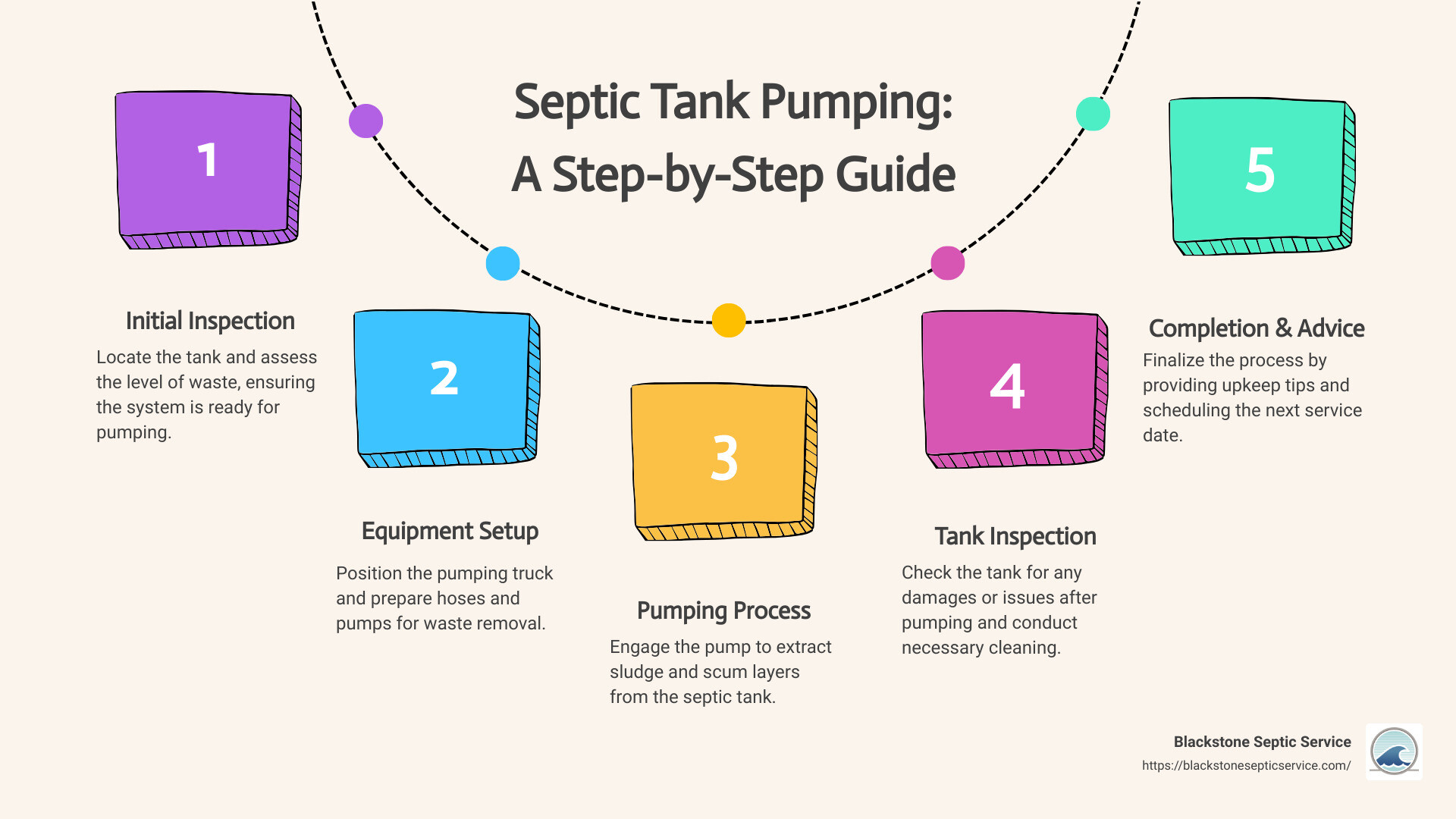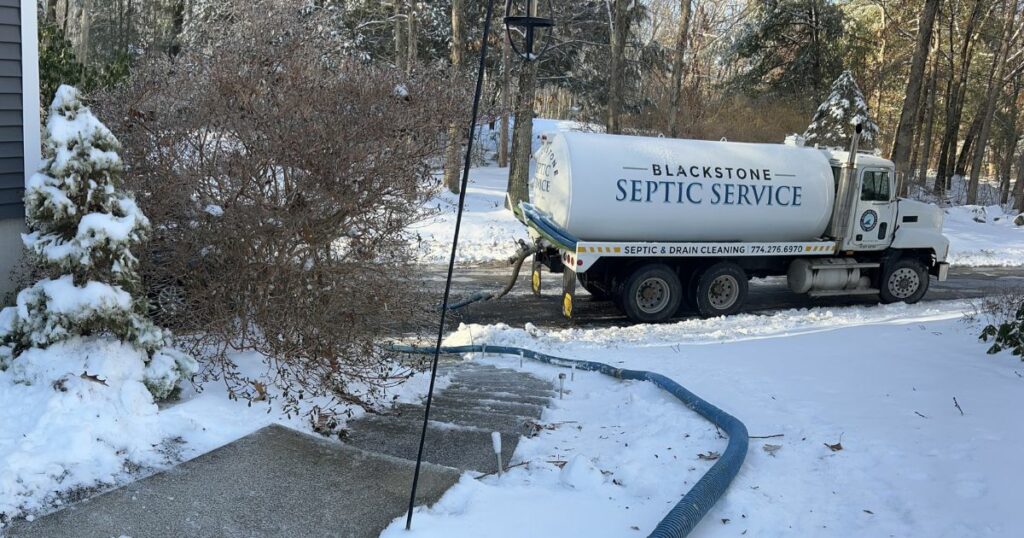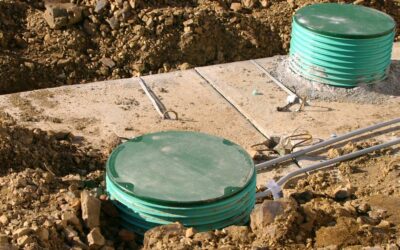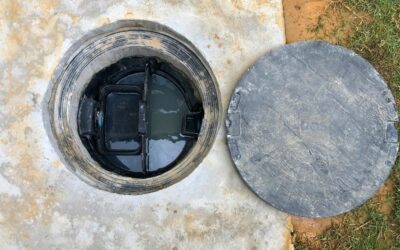Have you ever wondered, “how long does it take to pump a septic tank?” This is a question many homeowners find themselves asking when faced with slow drains or a flooded yard. Fear not – you’ve come to the right place for answers.
3 Facts on Septic Tank Pumping Frequency:
- The duration it takes to pump out a septic tank can vary greatly depending on various factors, including the size of the tank, type of pump used, and the degree of clogging.
- An efficient pumping process by a professional like Blackstone Septic Service can take anywhere from a few hours to an entire day.
- Regular maintenance will not only increase the efficiency of your system but also help prolong the lifespan of your septic tank, thereby saving you time and money in the long run.
At Blackstone Septic Service, our mission is simple – to provide top-tier solutions for your septic system needs. Our family-owned business is backed by a dedicated team of professionals with over 75 years of experience.

The importance of properly maintaining your septic system goes beyond ensuring your showers drain quickly or your toilets flush easily.
Regular pumping can prevent plumbing emergencies, minimize wear and tear on your system, and even help reduce pollution.
Table of Contents
Let’s make septic tanks less a thing of mystery, together. And remember, as homeowners in Blackstone, Central MA, and surrounding areas, you can always count on Blackstone Septic Service for reliable, fast, and efficient septic tank service.
The Process of Septic Tank Pumping
Understanding the process of septic tank pumping is essential to grasp how long it takes to pump a septic tank and why regular maintenance is crucial.
How a Septic System Works:
- Purpose and Location: Septic tanks are underground wastewater treatment systems primarily utilized in rural areas without centralized sewer systems.
- Treatment Process: They employ a combination of natural processes and technology to treat wastewater from various sources, including bathrooms, kitchen drains, and laundry.
- Layered Treatment Mechanism: Wastewater undergoes a separation process within the septic tank. Solids settle to form a sludge layer at the bottom, while lighter waste, like oil and grease, floats to create a scum layer at the top.
- Maintenance and Prevention: Regular maintenance is crucial as scum and sludge layers accumulate over time. To prevent overflow and system damage, these layers must be periodically pumped out.
The Importance of Regular Septic Tank Maintenance
Regular septic tank maintenance is crucial for a few reasons.
- First, it helps prevent plumbing emergencies such as sewage backups and slow drains. As the experts at Blackstone Septic Service, we minimize these risks by ensuring your septic tank is regularly pumped and operates at optimal efficiency.
- Second, regular septic tank pumping reduces pollution and potential water contamination. A poorly maintained septic tank can leak waste into local water sources, causing environmental and health hazards.
- Lastly, regular maintenance extends the lifespan of your septic system and saves you money in the long run. A well-maintained septic tank operates efficiently, reducing wear and tear, and preventing expensive and inconvenient breakdowns.
In conclusion, understanding how septic tanks work and the importance of regular maintenance is key to keeping your system functioning correctly.
Next, let’s delve into the factors that influence how long it takes to pump a septic tank.
Factors Influencing Septic Tank Pumping Duration

Size of the Septic Tank
If you’ve been wondering, “How long does it take to pump a septic tank?”, you’re not alone. This is a common question among homeowners, and the answer depends on several factors. The first key factor is the size of your tank.
How Long Does it Take to Pump a Septic Tank?
A smaller septic tank of around 1,000 to 1,250 gallons usually takes about 20 to 30 minutes to pump.
In contrast, larger tanks exceeding 1,500 gallons may need 45 to 60 minutes. These times can vary depending on the state of your septic tank and the equipment used for pumping.
For a typical three to four-bedroom home, the industry standard for septic tanks is 1,000 gallons. However, some homes may have a 1,250 to 1,500-gallon tank.
Larger households with tanks around 2,000 gallons will likely need more frequent pumping, extending the duration of each service.
Type of Septic Pump Used
The type of septic pump used can also impact the pumping time. There are different types of pumps designed to handle varying amounts of solid waste.
- A turbine pump is the fastest, ideal for septic tanks with little solid waste, sucking 10 to 20 gallons of water per minute directly into the pump truck.
- The effluent pump is slower but can handle medium amounts of solid waste. It’s a submersible pump attached to grinders to reduce solid waste.
- For heavier solid waste, a sewage ejector pump or a sewage grinder pump is used. These pumps are slower but can handle the toughest solid waste.
Household Size and Plumbing Usage
Finally, the size of your household and your plumbing usage also affect how long it takes to pump your tank. Larger families or households with heavy water usage will strain the septic system, making it fill up faster and lengthen the pumping time.
In conclusion, various factors determine the duration it takes to pump a septic tank. Understanding these factors can help you plan better and maintain your septic system efficiently. At Blackstone Septic Service, we’re committed to providing you with fast and efficient septic system services.
How to Determine When Your Septic Tank Needs Pumping
Knowing how to identify a full septic tank is crucial for maintaining a healthy and effective septic system.
Signs Your Septic Tank is Full
First, let’s talk about how you can tell if your septic tank is full. Some clear signs include trouble flushing your toilet, slow drains, or a gurgling sound coming from your pipes.
If your lawn is suddenly growing lush, green grass or water is pooling in your yard, these could also indicate a full septic tank. One of the most noticeable signs is a foul smell, similar to sewage, coming from your home or yard.
How Often Should You Pump Your Septic Tank?
A common question we often hear is, “how often should septic tank pumping be done?”
The answer can vary greatly depending on several factors such as the size of your tank, the number of people in your household, and your water usage.
However, as a general rule of thumb, household septic tanks should be inspected and pumped every three to five years.
Septic systems with electrical float switches, pumps, or mechanical components might need more frequent inspections, usually once a year.
Why Your Septic Tank Might Be Full After Pumping
You might be wondering why your septic tank could still be full even after pumping. It’s worth noting that septic tanks need to be pumped every few years to get rid of the built-up sludge.
However, issues like clogged pipes or drain field problems can quickly fill up your tank again after a pump. Additionally, using too much water can increase your tank’s liquid level.
At Blackstone Septic Service,, we not only pump your tank but also provide comprehensive septic system services to ensure your system is working efficiently and effectively.
In conclusion, knowing when to pump your septic tank involves understanding the signs of a full tank, sticking to a regular pumping schedule, and understanding the factors that could lead to your tank filling up quickly.
Tips to Reduce Septic Tank Pumping Time
Maintaining a septic system is an ongoing task. But, with the right practices, you can not only ensure a more effective septic system but also reduce how long it takes to have your septic tank pumped.
Regular Inspections and Repairs
Regular maintenance is key to a healthy septic system. This includes consistent inspections and timely repairs. At Blackstone Septic Service, we believe in “prevention is better than cure”.
By catching potential issues early on, such as holes in pipes or damaged baffles, you can reduce the time it takes to pump your septic tank. This, in turn, can significantly lower the cost and effort of septic pumping.
How to Avoid Expensive Repairs with Septic Systems
To avoid expensive repairs with septic tank pumping systems, establish a regular pumping schedule and monitor household water usage.
Additionally, practice proper waste disposal, consider landscaping impacts, schedule professional inspections, and educate residents on septic system care to ensure optimal performance and longevity.
Reducing Water Usage and Avoiding Harsh Chemicals
One crucial way to cut down on septic tank pumping time is by managing your water usage. When less water enters the tank, fewer solids accumulate, making for easier and quicker maintenance. You can also use low-flow fixtures to reduce water wastage.
Additionally, avoid flushing non-biodegradable substances like baby wipes, dental floss, or feminine hygiene products. These can clog your system and increase pumping time.
Similarly, refrain from pouring chemical drain openers, paints, or oils down the sink. These harsh substances can disrupt the balance of your septic system.
The Role of Professional Septic Tank Services
Finally, the role of professional septic tank services like ours cannot be overstated. At Blackstone Septic Service,, we bring our expertise, experience, and eco-friendly techniques to every job.
Our services ensure your system runs smoothly and efficiently, which helps decrease the time it takes to pump your septic tank.
We understand the importance of proper waste disposal. Not only does it keep your system in top shape, but it also protects the environment by preventing sewage from overflowing into local water sources.
In conclusion, reducing septic tank pumping time is not just about how long does it take to pump a septic tank. It’s also about how well you maintain your septic system.
By following these tips and partnering with professional septic services like Blackstone Septic Service, you can help ensure the longevity and efficiency of your septic system.
The Importance of Regular Septic Tank Pumping

Regular septic tank pumping is an essential part of maintaining a healthy and efficient septic system.
It helps in preventing plumbing emergencies, reducing pollution and water contamination, and minimizing wear and tear on the system.
As we’ve explored, various factors can influence how long it takes to pump a septic tank, including the size of the tank and the household, the volume of wastewater generated, and the type of pump used.
Blackstone Septic Service: Your Partner in Efficient Septic Tank Pumping
At Blackstone Septic Service,, we understand that the question of ‘how long does it take to pump a septic tank’ is not only about the time involved. It’s about ensuring that the entire process is carried out with utmost professionalism and care.
Our commitment to customer satisfaction is at the core of our operations. We pride ourselves on our prompt, reliable, and customer-centric approach.
We understand that dealing with septic system issues can be stressful. Our goal is to make the process as hassle-free and efficient as possible for you.
Our Highly Trained Technicians and Trustworthy Service
Our team is more than just a service provider; we are your partners in maintaining a healthy septic system. Our technicians are highly trained and bring over 75 years of experience in septic tanks.
We understand that you might be wondering, ‘how long does it take to pump a septic tank?’ We assure you that we use the best pumps for the process, which ensures that the job is done efficiently and within a reasonable timeframe. That’s why we offer quality grease trap cleaning services for commercial clients in the greater Worcester area.
Schedule your septic tank pumping with us today and let us help you keep your septic system running smoothly. If you need septic, grease trap, or excavation services fast, simply fill out the request service form on our website, and we’ll assist you as soon as possible.
For more information about our services or to book an appointment, don’t hesitate to contact us. You can also learn more about the importance of septic tank pumping and other septic system best practices on our Resources page.
Our Content
Our experienced septic tank specialists have carefully reviewed and edited all of the content to ensure that it meets our high standards for quality and accuracy. At Blackstone Septic Service, our mission is to provide unparalleled expertise and service excellence in the realm of septic system care. With a dedicated team of professionals committed to delivering top-tier solutions, we specialize in comprehensive services encompassing everything from routine maintenance like Massachusetts septic tank pumping, proper maintenance and thorough inspections, plumbing system, septic systems, and new system installations.
Customer satisfaction is at the core of our operations, and we pride ourselves on our prompt, reliable, and customer-centric approach. Blackstone Septic Service is a family-owned company with highly trained technicians, with over 75 years of experience in septic tanks.



